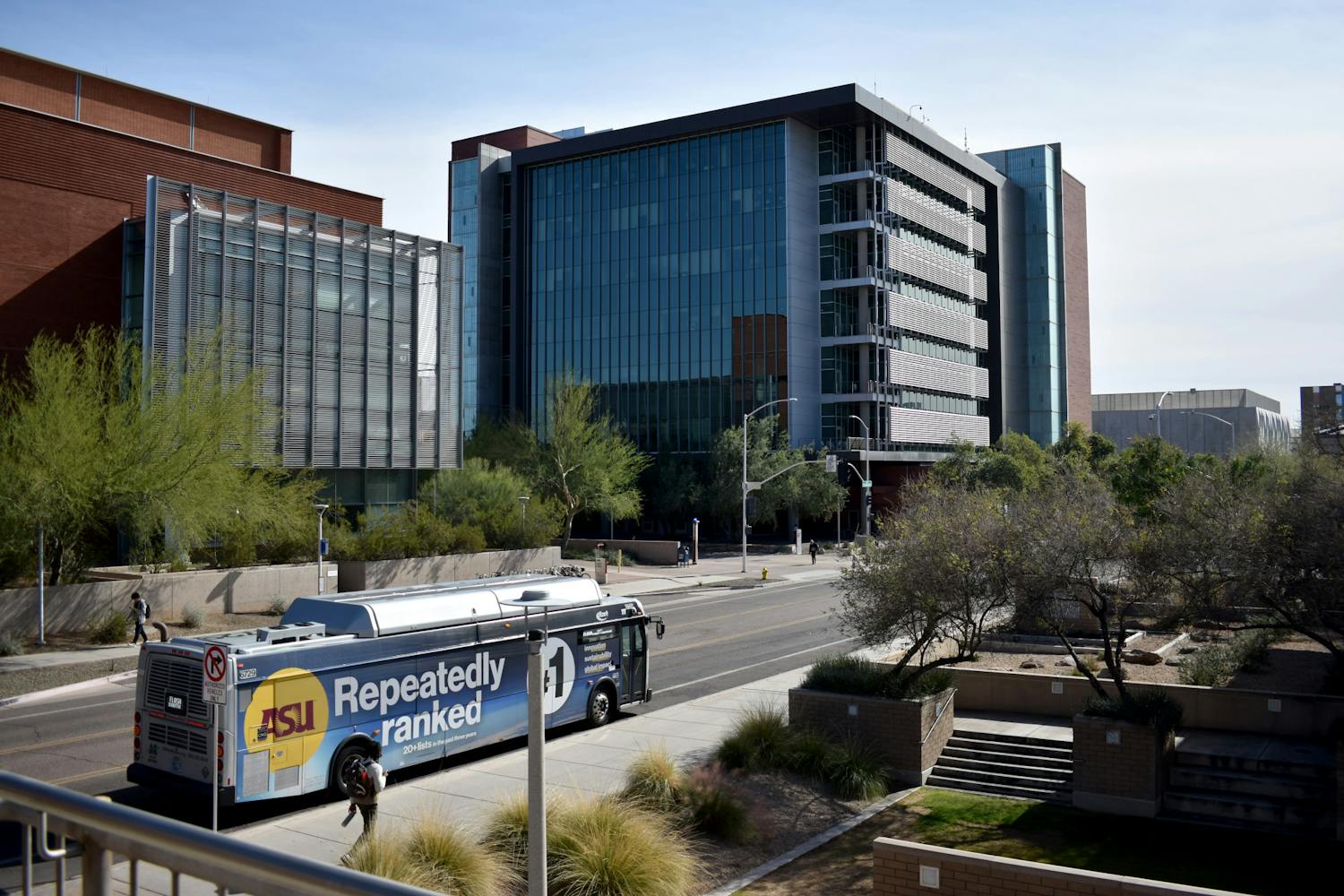In this episode of State Press Play, podcaster Travis Roberston sits down with two ASU community members, Ross Satchell and April Miller, Ph. D., to find out more about their experiences as people who cannot vote in the 2020 election, despite currently living in America. They discuss how to be involved in American democracy, even without a vote.
Read our 2020 Election Guide.
TRAVIS ROBERTSON:
Register to vote, vote by mail and vote early. These words have covered billboards and taken over TV ads for the past month. Maricopa County data shows turnout for this election has already surpassed 2016’s, with 900,000 votes already cast.
However, with all the attention directed at registering new voters, there are some people residing in America who aren't able to vote. If someone isn’t officially a U.S. citizen or is a permanent legal resident then they aren’t allowed to vote in American elections. This is Travis Robertson with The State Press, and for this podcast I talked with a student and a professor who can’t vote to understand their perspectives in the midst of this election.
First, I spoke with Ross Satchell, a graduate business analytics student. Ross has been staying on a student visa to attend ASU and has been a resident in America for 12 years.
ROSS SATCHELL:
I am currently not a citizen, I am an Australian citizen and I’m on a student visa so that doesn’t afford me the right to vote in any American elections.
I am definitely trying to get a green card but I’m not sure if I will go all the way to citizenship.
We originally came here on a non-immigrant visa. That went for two years and we thought we would only be here for two years, and we ended up renewing that a couple of times so that’s called an E-3 Visa. Then my wife went on an H1V Visa and I went on a student visa and now it looks like we might have the case for a green card application, considering there’s not a many green card applications happening at the moment. So we’ll see how that goes.
So E-3 is a specialty Visa given to Australian citizens who are in specialty occupations, and it’s a two-year non-immigrant visa, but you can pretty much renew it infinitely. So we did that a few times and then my wife went for an H1V, then she renewed that and you can only renew it once for a total of six years, and then after that you either have to have a green card process in or you have to leave, so we’re now trying to jump onto a different visa, so yeah we’re constantly chasing visas.
We’re in a weird situation. So, with Australian citizens if you have been outside of Australia for more than six years, they remove you from the voting role, so we have compulsory voting. Basically we have taxation without representation, I feel like there was a whole thing about that.
TRAVIS ROBERTSON:
Next, I spoke with April Miller. Miller is an Honors professor as well as a Barrett Faculty Fellow.
APRIL MILLER:
I am a Canadian citizen, I have a green card and have for almost five years now, so that makes me eligible to apply for citizenship, and I have started the process but it takes a while. So as such, I am not allowed to vote here in the United States and up until very recently — I’m from Canada — Canadian Law has just recently changed for expatriates so that I will be allowed to vote in the next Canadian election but I’ve been disenfranchised for, to be frank, most of my adult life.
America has much more flexible voting laws for expatriates, so people, if they're living outside the U.S., can still vote in American elections. It’s very difficult to do in Canada, it has been at least since I’ve been an adult and have been old enough to vote. You had to have been returning to Canada for many of months of a year, and if you weren’t then you lost your right to vote in Canada, so I have not been able to vote in Canada for years and just over a year ago now, maybe it’s closer to two years now. Basically there’s been kind of a legal case in Canada that was changing that, because it isn’t in keeping with the Canadian legal structures, but anyway. So they’ve changed it now, that I now can register, so the new voting system is very different, you don’t say "Vote for prime minister," you vote for your municipal representation, which makes it tricky because I don’t know where that would be for me given that I haven’t lived in Canada since 2002.
And that has been part of, to be frank, the motivation to finalizing, trying to apply for citizenship, is looking at it and saying “I haven’t been able to vote in American elections and I really wish I could with this one and previous ones too,” but especially right now. So it motivated me to file the paperwork and pay the money to end up with dual citizenship to be frank, so I guess that’s kind of my way of voting since I can’t right? To look at it and say I want to make sure that I can have a voice next time around.
I remember one time years ago shortly after I had moved to the United States and I'd been living in the U.S. for a couple of years and I was studying at Cornell and someone I knew there she had a son who was only about 8 years old and he was asking me that, like, “Does it frustrate you that you can’t vote in the upcoming election?” He was very interested in politics at only 8 and I said “Y8eah, a little bit” and he said “If you could vote who would you vote for?” And I won’t reveal who it was but the next time I saw him he had been at a farmers’ market with his mom and he bought me a bumper sticker with his own money for the candidate whom I had identified.
I said “That is so sweet of you, why did you give it to me?” and he said “Well I know you can’t vote, but you can influence people, so I thought you might like it,” and I don’t try to influence my students, obviously nothing like that, but I think it’s a message that has resonated for me and I thought well, I can influence people in other ways. I can get involved in phone banking and text banking, and I can do other kinds of things to support politicians that I believe in; so I have tried to do that and sort of to have my voice that way by lending support to campaigns that I feel strongly about, and encouraging my students to vote.
I bring in voter registration people and things like that and say “Don’t take your vote for granted because I wish I could weigh in, in either of the elections and countries I am deeply invested in, right? I’ve lived here a long time, since 2001 or 2002.
TRAVIS ROBERTSON:
Both Ross and Dr. Miller explained how you can get involved if you aren’t able to vote.
ROSS SATCHELL:
Well first of all figure out where you sit on the political spectrum and then try to get involved in political groups that are trying to support whatever it is that you’re interested in.
For example, my wife and I are involved in activism for Planned Parenthood. So, on the weekends currently when I’m studying, she’s doing phone banking to support left wing candidates or progressive candidates, and in previous elections going around and talking to people and just encouraging them to vote, saying "These are the people up for election these are their policies, please get out and vote and make your own decision,” and having conversations with people, not necessarily trying to convince them but just asking them questions on their life circumstances and who they think would best benefit them for their future.
APRIL MILLER:
I guess that’s one way to do it is to look at it and say “Can you help motivate other people you know? Can you maybe get involved in campaigns that you feel strongly about?” You know there’s a lot of kind of grassroots action, you know that kind of stuff so I think that can be one way to help make it feel less alienating, right? To feel like you have some sort of investment in the process, so that’s kind of my solution and something. I've certainly had conversations with other people who are disenfranchised for various reasons who don’t have voter rights, and I think instead of being apathetic like “I can’t vote so why worry about it?” Instead I look at it and think “OK, what other ways can I have an impact on the political system?” So that’s usually the advice I tend to give them
I’m really excited to see the higher numbers of people voting so far in this election, especially given the pandemic, so I think that’s really exciting. There’s a lot of interest in voting from people across the political spectrum, so that makes me feel pretty hopeful. And I hope young people especially will really kind of get out the vote and let their voices be heard.
Prove the people wrong who think that young people don’t care and don’t vote.
Reach the reporter at tprober6@asu.edu and follow @tprobermedia on Twitter.
Like The State Press on Facebook and follow @statepress on Twitter.




